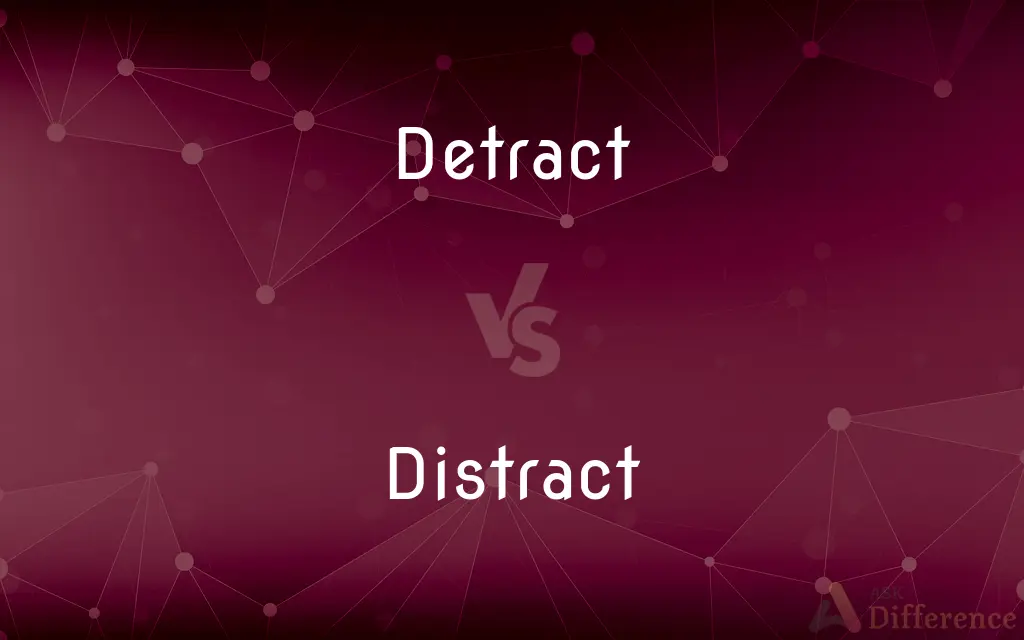Detract vs. Distract — What's the Difference?
By Fiza Rafique & Urooj Arif — Updated on April 1, 2024
Detract involves reducing value or esteem, while distract involves diverting attention.

Difference Between Detract and Distract
Table of Contents
ADVERTISEMENT
Key Differences
Detract and distract, though phonetically similar, diverge significantly in their applications and connotations. Detract centers on the act of taking away from the worth or value of something or someone, often in a subtle or undermining way. It suggests a diminishment of quality or esteem, as when criticism detracts from an individual's reputation. On the other hand, distract pertains to drawing one's attention or focus away from a task or subject of interest. It implies a diversion of mental resources, whether through external stimuli or internal preoccupations, leading to a decrease in concentration or productivity.
While detract is commonly used in contexts that involve reputation, value, or quality, suggesting a removal or diminishing effect, distract is more aligned with cognitive and perceptual processes. Distraction can occur due to any number of external or internal factors, such as noise, personal worries, or even multitasking, which leads to a split in focus. Whereas detracting has a more insidious undertone, often linked with the intentional or unintentional reduction in someone or something’s perceived value.
In practical scenarios, detracting might be seen in how negative comments can detract from an artist’s confidence, subtly eroding their sense of worth or achievement. Conversely, distracting is often more immediate and observable, as when loud construction noise outside a classroom distracts students from their studies. The impact of distraction is usually temporary and context-dependent, unlike the potentially lasting effects of detracting actions or words.
The use of detract versus distract is also indicative of the intent or outcome being discussed. Detracting often involves a negative assessment or outcome that diminishes the subject in question, requiring a subjective judgment or evaluation. In contrast, distracting simply denotes the act of attention being pulled away, with less emphasis on the value or quality of the distracted subject or object.
Despite their differences, both detract and distract share the underlying theme of reduction—be it in value, focus, or quality. However, detract is more often used in a metaphorical sense to indicate a decrease in value or esteem, while distract is primarily concerned with the practical implications of divided or redirected attention in various situations.
ADVERTISEMENT
Comparison Chart
Meaning
To reduce the worth, value, or esteem of something.
To divert attention away from something.
Usage Context
Often used in relation to value, reputation, or quality.
Commonly relates to attention, focus, or concentration.
Connotation
Generally negative, suggesting a lessening of value.
Neutral, focusing on the shift of attention without implying value judgment.
Outcome
Diminished esteem or value.
Diverted attention or focus.
Examples
Negative comments can detract from an individual's reputation.
Loud noises can distract someone from concentrating.
Compare with Definitions
Detract
To divert or draw away.
His charm detracts from his lack of expertise in the subject.
Distract
To pull in different directions; to divert or be diverted.
Multiple tasks at work distract her from focusing on her long-term goals.
Detract
To cause to be valued or regarded less; diminish.
A few grammatical errors should not detract from the overall excellence of the essay.
Distract
To cause to turn away from the original focus of attention or interest.
The loud music distracted him from his homework.
Detract
To diminish the importance or value of something.
Misinformation could detract from the effectiveness of public health campaigns.
Distract
To occupy the mind with something other than the current concern.
Playing video games can distract from stressful thoughts.
Detract
To belittle or disparage someone or something.
His attempt to detract his competitor's achievements backfired.
Distract
To provide a temporary diversion or amusement.
The magician's assistant is meant to distract the audience from the trick being performed.
Detract
To take away a part, as from quality, value, or reputation.
The scandal detracted from the politician's public image.
Distract
To cause mental confusion.
His anxiety distracted him to the point of forgetting his speech.
Detract
Diminish the worth or value of (a quality or achievement)
These quibbles in no way detract from her achievement
Distract
Prevent (someone) from concentrating on something
Don't allow noise to distract you from your work
Detract
Cause someone or something to be distracted or diverted from
The role did not include operational responsibilities that would detract him from his work
The complaint was timed to detract attention from the ethics issue
Distract
To cause (someone) to have difficulty paying attention to something
The voices in the other room distracted him, so he couldn't concentrate on his homework.
Detract
To draw or take away; divert
They could detract little from so solid an argument.
Distract
To attract (the attention) away from its original focus; divert.
Detract
To reduce the value, importance, or quality of something. Often used with from
Testimony that only detracts from the strength of the plaintiff's case.
Distract
To cause to feel worried or uneasy; unsettle
The company's workforce was distracted by the prospect of a takeover.
Detract
(intransitive) To take away; to withdraw or remove.
Distract
(transitive) To divert the attention of.
The crowd was distracted by a helicopter hovering over the stadium when the only goal of the game was scored.
Detract
(transitive) To take credit or reputation from; to defame or decry.
Distract
(transitive) To make crazy or insane; to drive to distraction.
Detract
To take away; to withdraw.
Detract much from the view of the without.
Distract
(obsolete) Separated; drawn asunder.
Detract
To take credit or reputation from; to defame.
That calumnious critic . . . Detracting what laboriously we do.
Distract
(obsolete) Insane; mad.
Detract
To take away a part or something, especially from one's credit; to lessen reputation; to derogate; to defame; - often with from.
It has been the fashion to detract both from the moral and literary character of Cicero.
Distract
Separated; drawn asunder.
Detract
Take away a part from; diminish;
His bad manners detract from his good character
Distract
Insane; mad.
Distract
To draw apart or away; to divide; to disjoin.
A city . . . distracted from itself.
Distract
To draw (the sight, mind, or attention) in different directions; to perplex; to confuse; as, to distract the eye; to distract the attention.
Mixed metaphors . . . distract the imagination.
Distract
To agitate by conflicting passions, or by a variety of motives or of cares; to confound; to harass.
Horror and doubt distractHis troubled thoughts.
Distract
To unsettle the reason of; to render insane; to craze; to madden; - most frequently used in the participle, distracted.
A poor mad soul; . . . poverty hath distracted her.
Distract
Draw someone's attention away from something;
The thief distracted the bystanders
He deflected his competitors
Distract
Disturb in mind or make uneasy or cause to be worried or alarmed;
She was rather perturbed by the news that her father was seriously ill
Common Curiosities
Is it possible to detract from one's own success?
Yes, individuals can detract from their own success through self-doubt or belittling their achievements.
Can technology distract children from learning?
Yes, technology, if not properly integrated, can distract children from learning by diverting their attention.
What does it mean to detract from something?
To detract from something means to reduce its value, quality, or esteem.
What role does context play in determining whether something distracts or detracts?
Context is crucial; the same action can distract in one situation and detract in another, depending on intent and outcomes.
How can a person distract another?
A person can distract another by diverting their attention away from what they are doing or thinking.
Can a positive comment detract from someone's reputation?
Typically, positive comments do not detract from someone’s reputation; detract implies a reduction in value or esteem.
What are common distractions in a workplace?
Common distractions in a workplace include loud conversations, email notifications, and personal smartphones.
How can criticism detract from an individual's confidence?
Criticism can detract from an individual's confidence by diminishing their self-esteem and sense of accomplishment.
Can a person's actions unintentionally detract from their goals?
Yes, a person's actions can unintentionally detract from their goals if they negatively impact their progress or reputation.
How does multitasking distract us?
Multitasking distracts by dividing our attention, reducing our focus and efficiency on any single task.
What might detract from the beauty of a landscape?
Pollution, litter, or excessive development could detract from the beauty of a landscape.
What measures can help reduce distractions at work?
Measures can include noise-canceling headphones, scheduled breaks, and designated quiet zones.
Can distractions ever be beneficial?
Yes, distractions can be beneficial if they provide a necessary break or help generate creative ideas.
How do distractions affect productivity?
Distractions typically reduce productivity by breaking concentration and increasing the time needed to complete tasks.
Why is it important to manage distractions?
Managing distractions is important for maintaining focus, increasing efficiency, and achieving goals more effectively.
Share Your Discovery

Previous Comparison
Ton vs. Tonnes
Next Comparison
Proverbial vs. FigurativeAuthor Spotlight
Written by
Fiza RafiqueFiza Rafique is a skilled content writer at AskDifference.com, where she meticulously refines and enhances written pieces. Drawing from her vast editorial expertise, Fiza ensures clarity, accuracy, and precision in every article. Passionate about language, she continually seeks to elevate the quality of content for readers worldwide.
Co-written by
Urooj ArifUrooj is a skilled content writer at Ask Difference, known for her exceptional ability to simplify complex topics into engaging and informative content. With a passion for research and a flair for clear, concise writing, she consistently delivers articles that resonate with our diverse audience.














































